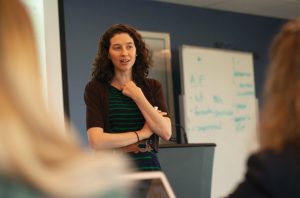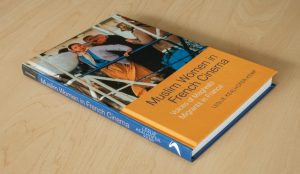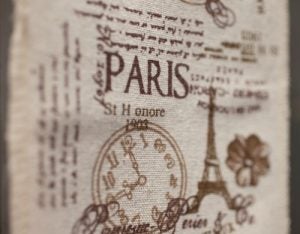~written by ARIA MIA LOBERTI ’20
Leslie Kealhofer-Kemp embodies the University of Rhode Island’s (URI) mission to cultivate ideas that transform the way we understand our world, each other and our differences.
“What we see represented on screen shapes our thoughts and our mentalities about others,” she says. 
Her research interests are interdisciplinary, focusing on contemporary French cinema and television primarily in terms of representations of immigrants and minority-ethnic populations in France.
Through her research, the associate professor of French has explored how the narratives, experiences, and identities of North African women in France are communicated through French cinema.
 Her book on the subject, Muslim Women in French Cinema: Voices of Maghrebi Migrants in France (Liverpool University Press, 2015), examines cinematic representations of Muslim women from Algeria, Morocco and Tunisia in documentaries, short films, made-for-television films, and feature films. Many of the films have not been the subject of any other research.
Her book on the subject, Muslim Women in French Cinema: Voices of Maghrebi Migrants in France (Liverpool University Press, 2015), examines cinematic representations of Muslim women from Algeria, Morocco and Tunisia in documentaries, short films, made-for-television films, and feature films. Many of the films have not been the subject of any other research.
“This book brought together my interests in film, immigration, and identity in France” she says.
France’s population is about 9 percent Muslim — the largest in Western Europe — and France continues to grapple with questions relating to integration and inclusion. By considering Muslim women’s perspectives through the lens of French cinema, Kealhofer-Kemp’s research contributes to a much-needed discussion
about how cultural productions can bring often-silenced voices and perspectives to the fore, as well as shape perceptions.
Kealhofer-Kemp’s distinctive research interests stem from a passion for French language and culture. She discovered her affinity for the French language through an introductory course in junior high school. Later, in high school, she was impacted by an inspiring French teacher who kept the study of French alive in their small town in Iowa. Kealhofer-Kemp traveled to France alongside her teacher, sister, and classmates.“Once I started using the language and meeting people in France, I immediately wanted to go back,” she says. “My world got a lot bigger when I started studying a language.”Fueled by these passions, Kealhofer-Kemp majored in French and political science at the University of Notre Dame. There, she took classes in French and Francophone literature and participated in a study abroad program in Angers, France. It was a pivotal experience.
“Doors had opened,” she says, “and I had a cultural immersion. When I got back, I wanted to find a way to bridge both of my majors, and I did this through a year-long senior thesis.”
Her project focused on the immigration policies of Nicolas Sarkozy, who at the time was France’s Interior Minister and later served as president.
Graduate school at the Winthrop-King Institute for French and Francophone Studies at Florida State University exposed her further to immigration issues in France, particularly those pertaining to the North African population.
 “During my first semester, I read a book for class about the son of Algerian migrants in France, within a post-colonial context,” she says. “It made me very interested in researching this part of France’s history.”
“During my first semester, I read a book for class about the son of Algerian migrants in France, within a post-colonial context,” she says. “It made me very interested in researching this part of France’s history.”
In addition to her research, she has taught courses in French and film and has organized film festivals on campus, bringing French-language film to the URI community.
Kealhofer-Kemp joined the faculty at URI in 2013. “It was one of only universities actively looking for someone doing work in French and film,” she says.
In spring 2020, she’ll travel to France as part of a sabbatical sponsored by a URI Faculty Career Enhancement grant. Working primarily in France’s National Audiovisual Institute, she will explore the emergence and implications of minority-ethnic stardom in France.
“The past 15 to 20 years have seen an increased number of actors and actresses from different backgrounds becoming stars in the French film industry,” she says. “The television and film industries are starting to reflect France’s population to a greater degree, and I am looking to explore this change.”
 By examining films, interviews, and records at the institute — many unavailable anyplace else — she will explore the films these actors and actresses make, the roles they are offered (or not), the construction of their star personas, and how they discuss their identities and careers.
By examining films, interviews, and records at the institute — many unavailable anyplace else — she will explore the films these actors and actresses make, the roles they are offered (or not), the construction of their star personas, and how they discuss their identities and careers.
Kealhofer-Kemp emphasizes that her research connects to teaching. She describes a distinct experience teaching a course on French cinema, in which she taught French majors and Film/Media majors in the Harrington School of Communication and Media, alongside students who had never studied the language or watched a French film.
“That is the beauty of having students from diverse areas of study and backgrounds,” Kealhofer-Kemp says. “I see films in new ways thanks to their questions and comments.”
Through this merger of disciplines and experiences, a highlight of the humanities, Kealhofer-Kemp wants to inspire her students as she was inspired. She is currently teaching an upper-level class entitled “Filming the Margins in French and Francophone Cinema,” which focuses on French language films whose protagonists are on the margins — of society, family, history, politically or in other ways.
Students who have paired a major in French with a major in science or engineering have shared with her the influence of studying a language and the humanities on careers and personal growth. Indeed, research shows that in a globalized, connected world, language proficiency and cultural competency are among the most important skills employers desire.
“Studying the humanities expands your worldview,” Kealhofer-Kemp says. “This can be done in many ways — for instance, through literature and film. It shapes how we see other people and interact with the world.”
